By DQ
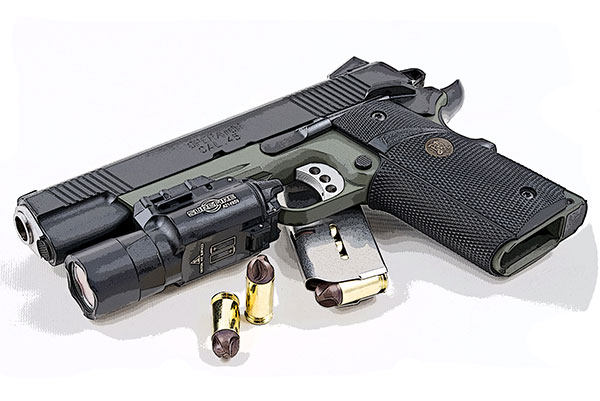
Legal scholars and courts have often ruled that the right to keep and bear arms must have some limitations or restraints. I agree with that. Indeed, none of the freedoms and rights listed in the Bill of Rights is bestowed upon the people without some limitations; otherwise anarchy would be the result. Thus, I, too, believe that there should be some sort of gun control.1
This concept was well understood in my home. When I was growing up, we didn’t leave guns lying around just anywhere. There were unwritten and yet well-understood rules that were intended to reduce and, preferably, eliminate accidents. Thus, we kept the guns in safe places in the house, secure and unloaded, etc. In short, we understood, as do most law-abiding citizens, that security and safety are part and parcel of owning a firearm.
Nowadays, my guns are kept under lock and key. I practice safety both inside the house and at the range. I have also pursued formal firearm training and have taken, and passed, an NRA course on the Basics of Pistol Training as well as completed a 2-day range course at Front Sight Firearms Training Institute. This continuing training is important because it keeps handling and safety skills sharp. And, just as my parents did in our household, I have established firm rules about the handling of firearms and ammunition in my home and we keep the weapons and ammo safely locked up.
While the right to keep and bear arms should never be infringed (see my article: The Right of the People to Keep and Bear Arms, 2017), common sense (as well as historical/legal precedent) dictates that we should exercise that right with our own safety and the safety of the general public as a primary concern. Fortunately, there are ample provisions for the judicial system to modernize the implementation of the amendments to limit gun accidents and needless gun violence. Along with the historic right of all citizens to keep and bear arms, there have always been laws that limit the use of said arms. For example, in the 1700’s, there were laws against hunting out of season or on someone else’s property, and laws against using arms for criminal behavior and anarchy (Cornell, 2006).
I believe that there should be laws prohibiting felons from owning and using firearms. After all, in committing felonies, they have exhibited their propensity for serious criminal behavior. Guns shouldn’t be used to commit any manner of atrocity, like in the commission of robbery or murder, for example. Anyone who uses firearms in such a manner should have their right to ownership revoked, as befits the nature and seriousness of the crime (i.e., as judged in a court of law).
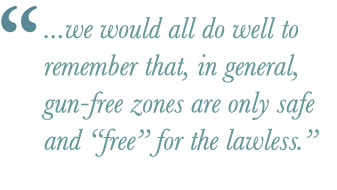 Further, I have no objection to prohibiting the possession of guns in special environments like grade schools and government buildings, except by those individuals specifically licensed to carry in those environments (more on my thoughts on licensing below). That said, we would all do well to remember that, in general, gun-free zones are only safe and “free” for the lawless. By definition, “law-abiding” citizens would never carry a gun in a gun-free zone, while a law-breaker (i.e., one with criminal intent) would have no compulsion against doing so. This is not a new idea: Cesare Beccaria (1738-1794), an Italian criminologist, jurist, philosopher, and politician was probably the first to observe that laws prohibiting individuals from carrying firearms only worked to the benefit of criminals (Cornell, 2006).
Further, I have no objection to prohibiting the possession of guns in special environments like grade schools and government buildings, except by those individuals specifically licensed to carry in those environments (more on my thoughts on licensing below). That said, we would all do well to remember that, in general, gun-free zones are only safe and “free” for the lawless. By definition, “law-abiding” citizens would never carry a gun in a gun-free zone, while a law-breaker (i.e., one with criminal intent) would have no compulsion against doing so. This is not a new idea: Cesare Beccaria (1738-1794), an Italian criminologist, jurist, philosopher, and politician was probably the first to observe that laws prohibiting individuals from carrying firearms only worked to the benefit of criminals (Cornell, 2006).
In summary, there may be many conditions and practices for which the carry and use of firearms would be inconsistent with “the right to keep and bear arms.” Therefore, some reasonable limitations should be legislated and enforced. I won’t pretend to know what limitations should be applied in all cases, but in each case, the legality should be thoroughly examined by our judicial system, while remaining faithful to the intent of the Bill of Rights. This will most likely require the service of the entirety of our legal system, including the Supreme Court.
License to Carry
I believe in the right of law-abiding citizens to carry arms in public (with some exceptions, of course). However, those individuals should be properly licensed. I also think that anyone who is licensed to carry a weapon, whether concealed or open-carry, should undergo training as a pre-condition to carrying in public.
Shooting and handling guns is a perishable skill. It takes a good amount of practice to maintain proficiency when it comes to safe handling and use of a firearm. I visit my local shooting range often and in almost every instance, I see examples of people who ignore, or are unaware of, basic safety rules. Some will exhibit a failure to safely keep their gun muzzle pointing down range (i.e., in a safe direction) or cannot safely manage weapon malfunctions. Therefore, I believe anyone licensed to carry a firearm in public should also maintain a continuing path of training.
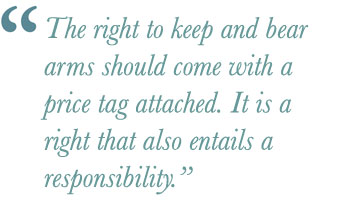 The right to keep and bear arms should come with a price tag attached. It is a right that also entails a responsibility. To me that means, if you intend to carry a weapon in public, you should be willing and able to become trained and continue that training so as to best insure the safety of the public. And, if you keep guns in your home, you are responsible for your own safety as well as the safety of your family and any guests.
The right to keep and bear arms should come with a price tag attached. It is a right that also entails a responsibility. To me that means, if you intend to carry a weapon in public, you should be willing and able to become trained and continue that training so as to best insure the safety of the public. And, if you keep guns in your home, you are responsible for your own safety as well as the safety of your family and any guests.
Legal limitations on the licensing for carry of guns in public should be carefully considered on a case-by-case basis. Each situation should be submitted to rigorous scrutiny as to how it comports with the Constitution in terms of fairness to all citizens, in terms of safety, and in light of the appropriateness of any particular venue.
Wholesale gun bans, however, fly in the face of the right of the people to keep and bear arms. The Second Amendment guarantees the right of citizens to own and use firearms. The right of the people to keep and bear arms was intended to provide every citizen the opportunity to protect and defend themselves, their family, their property and, if necessary, the state. The right to keep and bear arms also necessarily implies that those same citizens have the right to practice with said firearms, to manufacture or purchase ammunition, and to use the firearms to harvest game (all applicable permits notwithstanding).
Gun Control or People Control?
Gun control becomes an issue every time a new and tragic shooting claims the lives of innocent civilians. However, guns should not be blamed for shooting-related deaths. That’s not rocket science; it’s common sense. ANY loss of life is tragic. And yet, you can’t blame guns for shooting-related deaths any more than you can blame cars for the thousands of traffic-related deaths each year.
Nearly 40,000 people die each year on our highways (versus 35,000 deaths due to “injury by firearms”).2 In each and every case, there is personal liability or even criminal negligence as the cause of these auto accidents. In other words, the fault lies with people.
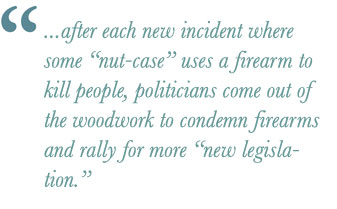 Nobody in our government holds a press conference the day after Labor Day (or any other holiday weekend) expressing grief and anger and blaming cars for the senseless killing of hundreds of people on our highways. And yet, after each new incident where some “nut-case” uses a firearm to kill people, politicians come out of the woodwork to condemn firearms and rally for more “new legislation.”
Nobody in our government holds a press conference the day after Labor Day (or any other holiday weekend) expressing grief and anger and blaming cars for the senseless killing of hundreds of people on our highways. And yet, after each new incident where some “nut-case” uses a firearm to kill people, politicians come out of the woodwork to condemn firearms and rally for more “new legislation.”
I have not heard legislators argue for the right to ban ownership and use of cars when those cars are used with criminal results. The reason is simple: people are to blame for the results of criminal and negligent behavior, not cars. Legislators can enact new laws that hope to create safer driving conditions or that make cars safer, but you won’t see them trying to prevent people from purchasing or driving cars. And for good reason: the majority of citizen drivers are safe and law-abiding. The same is true of the majority of gun owners.
There is no crystal ball that will tell you who will purchase a car and then operate it in a manner that will cause death to themselves or others. But one thing is sure, a car is not going to start itself up and streak down the road and run over Aunt Bertha as she’s checking her mailbox. The car has no mal intent and the car is not negligent. The car is not sentient and therefore cannot be held to blame for criminal or even accidental actions. The same is true of guns.
Requirements for Owning a Car versus a Gun
Anyone can buy and drive a car as long as they pass the most rudimentary requirements. They need to be of certain age and they need to take and pass a written and driving exam to gain their license. They need to possess and keep proof of insurance and then renew their license and insurance on a regular basis. Upon these conditions, they can buy any brand of car they want and whatever type they want (e.g., mini-van, SUV, sport, etc.). There is no limit to the number they can legally possess and they can buy a relatively slow Honda or a jet-fast Ferrari. There are basically no universal restrictions to car ownership.
Gun owners face far more restrictive conditions when it comes to the purchase and use of firearms. [I am delimiting my comments here to the state of California, which is where I live and can speak with some certainty about the gun laws.] In California, prospective gun owners need to meet an age requirement and need to pass a written and practical test in the presence of a DOJ Certified instructor to procure a Firearm Safety Permit. This must be completed before they are eligible to purchase a gun. They will need to renew that permit every 5 years. (Note: there is a 47-page study guide that is provided by the Office of the Attorney General of the California Department of Justice to people who want to study for the permit exam.)
Also, before purchasing any and every gun, prospective gun owners will need to be fingerprinted and submit to a background check to determine if they’ve been convicted of criminal felonies, have a history of mental illness, or are illegal aliens. They will need to pass a safety proficiency test before taking possession of each gun they purchase. Finally, their names, background information and the serial number of their guns will be registered with the Department of Justice.
All of these conditions merely allow firearms to be kept and used on private property. Most guns can legally exist only in the homes of their owners, or on a firing range (and in transit). In other words, with a few exceptions (i.e., Peace Officers and Concealed Carry permit holders), firearms can only be kept and used on private property and only when the property owner allows it and only when the property is in an area where shooting is permitted by law. In that respect, gun ownership is unlike car ownership, which allows the owners to keep and drive the cars on most any highway and byway across the entirety of the United States.
Legislating Against Rights
Each year, more and more legislation is submitted with the goal of further-restricting citizen’s rights to “keep and bear arms.” And yet, there is no good reason that law-abiding citizens should be pre-empted from purchasing and carrying guns just because the potential exists that the guns may be used to perpetrate criminal behavior. You put that same requirement to work in purchasing cars or paint thinner and you will have an avalanche of public outcry; and rightly so.
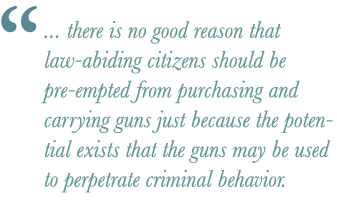 Legislating against rights and freedoms of American citizens, both in California and throughout the nation, seems to be a recreational pastime. And yet, it becomes a slippery slope when it targets your personally perceived freedoms. For example, it should be a real wake-up call when you see attempts to legislate fatty foods, sugary drinks, plastic bags, toy guns, bottled water, horse drawn carriages, tailgate parties, the pledge of allegiance, wax candles and even goldfish. That’s right, each of these things, and more, has seen legislators, politicians, delegates, college presidents and/or others try to enact processes (i.e., new laws, policies, or even challenges to the U.S. Constitution) that would lead (or have already led) to their elimination. I’m not saying there shouldn’t be reasonable limitations. My point is that once we freely allow a government to severely restrict or eliminate our freedoms, rights, or preferred lifestyle pursuits, we will eventually see our own quality of life and pursuits hanging in the balance.
Legislating against rights and freedoms of American citizens, both in California and throughout the nation, seems to be a recreational pastime. And yet, it becomes a slippery slope when it targets your personally perceived freedoms. For example, it should be a real wake-up call when you see attempts to legislate fatty foods, sugary drinks, plastic bags, toy guns, bottled water, horse drawn carriages, tailgate parties, the pledge of allegiance, wax candles and even goldfish. That’s right, each of these things, and more, has seen legislators, politicians, delegates, college presidents and/or others try to enact processes (i.e., new laws, policies, or even challenges to the U.S. Constitution) that would lead (or have already led) to their elimination. I’m not saying there shouldn’t be reasonable limitations. My point is that once we freely allow a government to severely restrict or eliminate our freedoms, rights, or preferred lifestyle pursuits, we will eventually see our own quality of life and pursuits hanging in the balance.
I believe in reasonable limitations to the purchase and use of firearms, but only to the extent that they preserve the fundamental right of the people to “keep and bear arms.” Our attitudes toward, and legislative limits upon, firearms must be guided by the Constitution and therefore must: “establish justice” and “insure domestic tranquility” of all citizens. Our laws must “promote the general welfare,” “provide for the common defense” of our citizens and “secure the blessings of liberty to ourselves and our posterity.” (Preamble to the Constitution of the United States)
In the end, the right to keep and bear arms is just one of the many truths that have been historically held to be ‘self-evident’ because, with some limits, they form our basic right to life, liberty and the pursuit of happiness:
“We hold these truths to be self-evident, that all men are created equal, that they are endowed by their Creator with certain unalienable Rights, that among these are Life, Liberty and the pursuit of Happiness.” (The Declaration of Independence)
References Cited
Cornell, S. (2006). A well-regulated militia: the Founding Fathers and the origins of gun control in America. Oxford: Oxford University Press.
About the Author
David P. Diaz, Ed.D. is an author, retired college professor, and the publisher and owner of Things I Believe Project. His writings have spanned the gamut from peer-reviewed technical articles to his memoir, which won the 2006 American Book Award. Dr. Diaz holds Bachelor and Master’s of Science degrees from California Polytechnic State University and a doctoral degree in education from Nova Southeastern University.
Footnotes
- Gun Control. I use the term “gun control” in this article only because it is a term that has been employed with such regularity in the press and by politicians that it is somewhat of a nom de guerre and a rallying cry of those who oppose the right to keep and bear arms. As such, it has become a part of generalized vocabulary and serves as a commonly understood term to introduce this essay.
However, the term itself is actually a misnomer. The term has been perpetrated by those who would be quite happy if all were denied the right to keep and bear arms. The terms “gun control,” or “gun violence,” ascribe human characteristics to inanimate, non-sentient objects. However, guns have no capacity to control their behavior. Nor do they have any innate propensity for violence. Thus, though all these terms are inaccurate, they have become catchphrases for anti-firearm politics.
- Deaths due to injury by firearms include, Accidental discharge of firearm; intentional self-harm by firearm; assault by firearm; firearm discharge, but with undetermined intent; and legal intervention involving firearm discharge (i.e., use of firearm by law enforcement personnel).